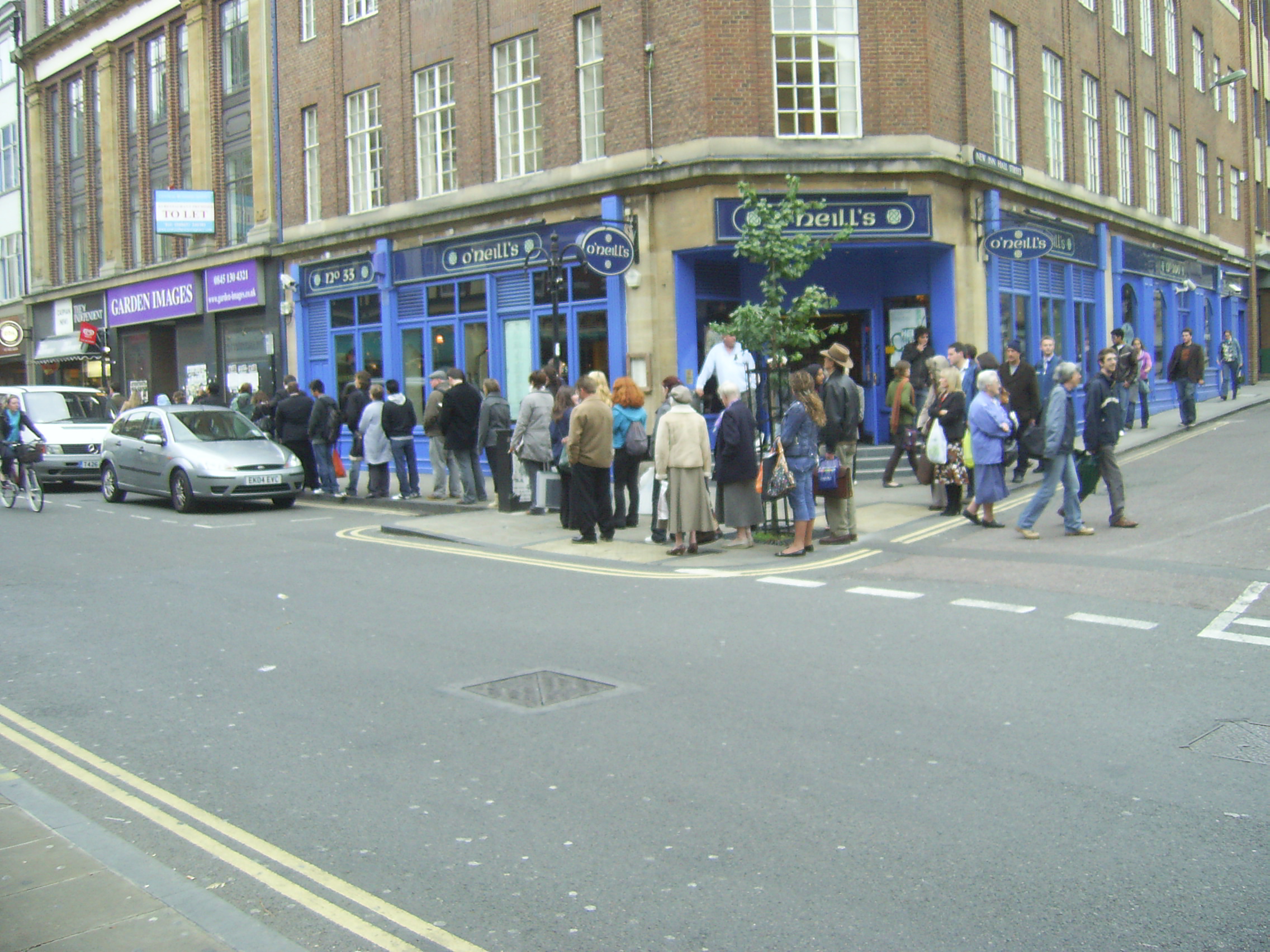Először is a következő igen fontos felfedezést tettem: az angolok felette udvarias népség. Erre vonatkozóan több bizonyítékom is van:
1, sorban állnak a buszmegállóban: a sor akár 50m-es is lehet és BEFORDUL A SARKON! ez egészen hihetetlen az én földhözragadt Ke-Kö-Európai szememnek. NB. a boltban egy kedves pakisztáni fiatalember áll (kizárólag ázsiaiak dolgoznak a boltban), és a fent villogó táblával összhangban adja ki az ukázt, hogy ki melyik pénztárhoz menjen.

2, amikor probléma volt a WiFi-vel (mer' itt az is van ám bibibeeeeeeee) megkértem az udvarházbéli IT-szakhölgyet, hogy segítsen. Amikor 10 perce késett, felmentem a könyvelőhöz, aki a 10 perces késés tényét meghallva rögtön "Oh, dear!" felkiáltással rohant a telefonhoz, olyan arckifejezéssel, mintha legalábbis azt találtam volna mondani, hogy szegény informatikusuk jobblétre szenderült, s ezért "I'm afraid" nem tud jönni.
3, a könyvpiacon egy kedves, középkorú angol házaspár nézegette velünk együtt a könyveket. Kis idő után a férfi arrébb ment, hogy szemügyre vegye a másik standon sorakozó detektívregényeket. Kisvártatva én is követtem, de hirtelen arra lettem figyelmes, hogy egy irdatlan hangeffektus kíséretében a kabátomat már-már meglebegtető szellentés hagyja el decens brit seggét. Villámgyorsan tekintetbe véve az enyhítő körülményt, hogy a flatuláció szabadtéri előadásmódja jóval környezetkímélőbb, derék angolunk megőrizve hidegvérét, csupán egy (a végbélszélhez hasonlóan) jól hallható: "Oh, God!"-dal jelezte a nyilvános bocsánatkérést. Még jó, hogy csak én hallottam, a Dorcihoz csak a bélgáz távozásának dallama jutott el.
4, Kivételesen busszal mentünk be Oxforba (a központ kisbusza helyett). A megállóban álltunk,amikor megállt melletünk egy autós és felhomályosított, hogy innen már nem megy busz, el kell mennünk a következő megállóig. A következő megállóba érve realizáltuk, hogy lekéstük a buszt, ezért a 30 perces megállókereső bolyongásra, a 3 perces buszlekésésre és a 45 perces előttünk álló várakozásra való tekintettel sört bontottunk. Miután megittuk, a megálló melleti házból kijött egy szívélyes ánglius, s közölte, hogy itt ugyan már nem jár busz, de ha elmeyünk a következő megállóba, biztosan eljutunk még ma Oxfordba (nyilván nem akarta megzavarni a kedélyes sörözgetésünket az É-oxfordi ipari park bejáratánál).
5, A takarítónéni 2 adag zöldséges rizst hagyott itt nekünk, tehát volt meleg kaja, mikor megérkeztünk. Az ízét (na jó, ízetlenségét) inkább nem méltatnám, de az igyekezet mindenképpen dícséretes. Emellett müzli, tej, cukor, almalé, tea (naná) volt az alapfelszerelés (jellemző, a só gondolom eszébe se jutott, mint a legtöbb gyorskaja-gyárosnak/árusnak se).
6, A hentes "Sir"-nek szólított (haha).
7, A központ minibuszát 3 sofőr vezeti (nem egyszerre). A fő-fő sofőrrel először az utolsó buszon találkoztunk. Hazavitt minket, de mielőtt kiszálltam volna, 25 perces előadást hallgathattunk meg tőle önnön fontosságáról, amit mint fő-fő-sofőr képvisel. Ennek a lényege röviden:
- ő 1992 óta vezeti a buszt
- ki mikor van szolgálatban
- mekkora idióta a másik két sofőr
- miért kell nekünk azt csinálni, amit ő mond
- és, ami a legfontosabb (ezt abból gondolom, hogy ez kb. 15-ször elhangzott) "We leave dead on time!"
Na látjátok, ő nem volt udvarias, úgyhogy félre a sztereotípiákkal.
Nincsenek megjegyzések:
Megjegyzés küldése